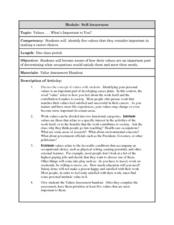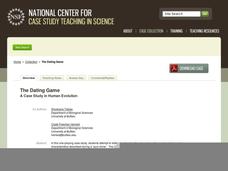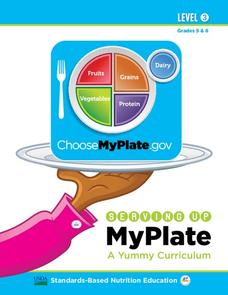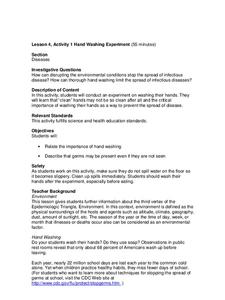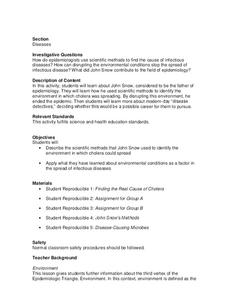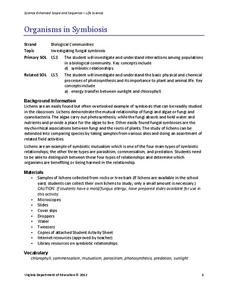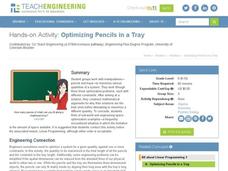Curated OER
Values...What's Important to You?
As your scholars begin their career study, it's important they understand their personal intrinsic values. What makes them feel rewarded? There are discussion prompts here to get learners thinking about specific careers, and they also...
National Center for Case Study Teaching in Science
The Dating Game
Learn about the human's ancestors through the (carbon) Dating Game. Use the script to have your high schoolers act out one round of the game. Once they have the idea, they will research another human ancestor and play a second round the...
Nemours KidsHealth
Male Reproductive System
Young pupils are introduced to the male reproductive system, the process of reproduction and conception through worksheets, discussion, and instructional guidance.
NOAA
Plate Tectonics I
Young geologists get a glimpse beneath the earth's surface in this plate tectonics investigation. After first learning about the different layers of the earth and the constant movement of its plates, young geologists work in small groups...
National Science Teacher Association
Middle School Sampler: Science
Focus on inquiry-based learning in your science class with a series of activities designed for middle schoolers. A helpful packet samples four different texts, which include activities about predator-prey relationships, Earth's axis and...
US Department of Agriculture
Serving Up My Plate
Within three nutrition-themed, inquiry-based learning opportunities, pupils take notice of their eating habits; delve deep into the five food groups, gain experience in planning meals, participate in a taste test, and explore ads from...
Virginia Department of Education
Planet Line-Ups
Should Pluto be considered a planet or a dwarf planet? Scholars research planets in our solar system to understand their similarities and differences. It also includes memory activities related to the order of the planets.
Massachusetts Institute of Technology
Lego Atoms and Molecules: Chemical Reactions
Show young chemists what a chemical reaction looks like with two parts of a hands-on experiment. First, learners conduct a wet lab where they observe the reactants (baking soda and calcium chloride, with phenolsulfonphthalein) before,...
Virginia Department of Education
Light and the Electromagnetic Spectrum
Lead your class in a fun-filled team activity that encourages collaboration while learning important concepts. Pupils actively participate in a discussion on the experimental design and the role of mirrors. They perform group activities...
NASA
An Astronaut in Motion
How do you model the movement of an astronaut? The activity features software that uses an avatar to mimic movement. Groups work to determine the translation between the pre-image and the image. They then experiment with reflections in...
Centers for Disease Control and Prevention
Hand Washing Experiment
An engaging experiment allows scholars to understand why the recommendation is to wash for 20 seconds with soap and water — while making them aware of their own habits!
Centers for Disease Control and Prevention
Diseases
During a cholera outbreak, scientists presented two theories; one theory was based on miasma and the other on germs and contaminated water. The lesson looks at the scientific process for finding the real culprit.
Virginia Department of Education
Go with the Flow
How does nature's hierarchy relate to our local human environment? Answer this question, along with others, as the class visually depicts the natural hierarchy provided by nature. Pupils discuss each piece of the pyramid and its energy...
Virginia Department of Education
Organisms in Symbiosis
Searching for an activity that allows emerging biologists to explore symbiosis up close and personal? Pupils collect samples and view lichens through a microscope and conclude with a discussion about the relationship they have with other...
Teach Engineering
Chromatography Lab
Groups use alcohol and chromatography paper to separate the color components of black ink. The purpose of the activity is to allow the class to become aware that mixtures exist in hidden places.
Virginia Department of Education
Linear Modeling
An inquiry-based algebra lesson explores real-world applications of linear functions. Scholars investigate four different situations that can be modeled by linear functions, identifying the rate of change, as well as the strength and...
Teach Engineering
Optimizing Pencils in a Tray
What do you call a story about a broken pencil? Pointless. Scholars may not be telling stories when using the resource, but they are solving optimization problems involving the maximum number of pencils that can fit on a tray. They...
Chicago Botanic Garden
Are Global CO2 Levels Changing?
According to the Mauna Loa observatory, carbon dioxide levels increased by 3 ppm in our atmosphere between 2015–2016. Individuals analyze carbon dioxide data from around the world and then share this with a home group in lesson three of...
Chicago Botanic Garden
Carbon, Greenhouse Gases, and Climate
Climate models mathematically represent the interactions of the atmosphere, oceans, land, sun, surface, and ice. Part two in the series of four lessons looks at the role greenhouse gases play in keeping Earth warm and has participants...
Teach Engineering
Magical Motion
Make solutions to projectile motion problems magically appear using equations. Pupils watch a clip from a Harry Potter movie and find the length of time it takes for a remembrall to fall into Harry's hands. They use a projectile motion...
University of Minnesota
Dendritic Spines Lab
This is your brain on drugs ... literally! Your neuroscientists-in-training examine the evidence of drug use on the human brain and how neurons change their connectivity when altered by drugs. They then work together to create testing...
NOAA
To Explore Strange New Worlds
It's time to boldly go where your class has not gone before! The introductory lesson plan in a five-part series takes young oceanographers aboard the NOAA Ship Okeanos to begin a study of ocean exploration. The lesson plan includes a...
NOAA
A Day in the Life of an Ocean Explorer
What's life like aboard an ocean exploration vessel? Junior oceanographers examine the important role of communication in ocean research in lesson plan two of a five-part series from NOAA. The materials introduce the class to life on...
NOAA
Wet Maps
How do oceanographers make maps under water? Junior explorers discover the technologies and processes involved in creating bathymetric maps in part three of a five-part series designed for fifth- and sixth-grade pupils. The lesson...
Other popular searches
- Adaptive Physical Education
- Physical Education Games
- Physical Education Warm Ups
- Physical Education Lessons
- "Physical Education" | Pe
- Physical Education Adhd
- Physical Education Athletics
- Physical Education & Health
- Physical Education Add
- Physical Education Pe
- Physical Education Added
- Physical Education Programs


